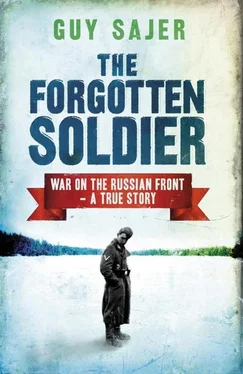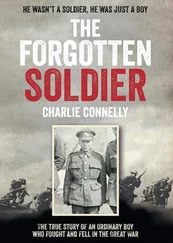I run to rejoin my group, and give two eggs to a fat young Austrian, who stares at me in stupefaction. I consume the five eggs that are left, together with a good part of their shells, in less than a hundred yards.
We arrive at the shooting range. There are at least a thousand men, and the firing is nonstop. We march up to a group of armed men coming to meet us, and take over their guns. I draw twenty-four cartridges, which I will fire when it’s my turn — not as many as some men, but about average.
The eggs begin to work in my stomach, and I don’t feel altogether easy. Night falls. We are all ravenous. We leave the shooting range with our guns on our shoulders. Other companies set off in other directions. We march down a narrow graveled road which does not appear to be the same one we took when we came.
In fact, we shall have to tramp four miles in quick-step, singing, before we get back to that damned castle. It seems that singing while marching is an excellent respiratory exercise. As I am not dead, my lungs must have turned into bellows that evening. Between songs, I glance at my breathless companions, and notice a look of anxiety on every face. As I plainly don’t understand, Peter Deleige, who is one diagonal step ahead of me, points to his wrist, where his watch gleams in the dusk, and whispers: “The time.”
Good Lord! I catch on. It is almost night, well past five o’clock, and we’ve missed supper.
The whole section seems to react, and our pace accelerates. Perhaps they’ve saved something for us. We cling to this hope, dominating the exhaustion which threatens to overwhelm us. We outdistance the feldwebel by one and then by two paces. He stares at us in astonishment, begins to shout, and then collects himself: “So you think you can leave me behind, do you? Well, let’s go then.”
On orders, we break into “Die Wolken ziehn” for the seventh time, and, without slackening our pace, cross the massive stone bridge which straddles the moat. We peer into the shadowy courtyard, faintly illuminated by a few dim bulbs. A column of soldiers carrying mess tins and drinking cans is queuing in front of a sidecar which carries three enormous caldrons.
At the sergeant’s order we halt, and wait for his next order to break ranks and fetch our mess tins. But, alas, that moment has not yet come. This sadist obliges us to put our guns back in the gun rack, in their proper numerical order, which takes another ten minutes. We are frantic. Then, abruptly: “Go and see if there’s anything left, and in order!”
We hold ourselves in as far as the armory door. But, once outside, nothing can stop us. We surge wildly toward our quarters. Our hobnailed boots throw off sparks as they clatter against the courtyard pavement. We rush up the monumental stone staircase like eighty madmen, driving ahead of us the few soldiers who are trying to come back down. In the dormitories the melee increases, as no one is yet entirely sure which room and bed he occupies. We run in and out of the rooms as if possessed by demons, and it seems inevitable that someone is trying to get out exactly as another man is trying to get in. We crash, swear, exchange blows. I myself receive a bash on the helmet.
Some lucky devils who have had the good luck to find their mess tins right away run back down the stairs at a triple gallop. The swine! They’ll eat everything that’s left! Finally, I find my pack, but as I am unhooking my mess tin someone jumps onto my bed with his dirty boots, and knocks everything to the floor. My mess tin rolls under the next bed, and when I dive to retrieve it, my hand is trampled.
I return to the courtyard, and there, under the benevolent gaze of our noncom, I take my place in line, relieved to see that there is still one caldron with something in it.
In this momentary respite, I inspect my companions. Every face wears the same burning look of exhaustion. The thin ones, like me, have huge circles under their eyes, and the plumper ones are ashen.
I catch sight of Bruno Lensen. He has already been served, and is wolfing down his food as he walks away with careful little steps. Fahrstein, Olensheim, Lindberg, Hals: they are all doing the same thing. When my turn comes, I open my mess tin. I haven’t had a chance to wash it since my last meal, and traces of food still cling to its interior.
The cook empties his ladle into my tin, and puts a large helping of yogurt on my plate. I sit down a little way off, on one of the benches which stand against the wall of the kitchen block. Our galloping return at least had the advantage of making me get rid of the eggs I had devoured so precipitately that afternoon. I bolt my meal with ravenous hunger. The food isn’t at all bad. I get up and walk over to the light of an unshaded window, and peer into the tin. It contains what looks like a mixture of semolina, prunes, and chunks of meat. It will all be gone in a few minutes.
As we haven’t been given anything to drink, I go over to the horse troughs like everybody else, and swallow down three or four cups of icy water. And I take the opportunity to rinse my plate. Evening assembly and roll call takes place in a large hall where a corporal addresses us on the subject of the German Reich. It is eight o’clock. Lights-out is sounded on a small bugle. We go back to our rooms and fall into a dead sleep.
I have just spent my first day in Poland. It is September 18, 1942.
We are out of bed at five o’clock the next morning, which is how it will be for the next two weeks. We shall also be undergoing intensive training, and shall cross that damned pond every day, no longer as bathers but with full combat equipment.
Exhausted, soaked to the skin, we fling ourselves onto our mattresses every evening, overwhelmed by a crushing sleep, without even the energy to write to our families.
As a marksman I am making rapid progress. I must have fired over five hundred cartridges, on maneuvers and at the shooting range, during the fortnight, and hurled at least fifty practice grenades.
The days are gray. From time to time it rains, and I wonder if the rain is a foretaste of winter. But it is only the fifth of October. This morning it is clear, with a light frost. The rest of the day will probably be beautiful. We salute the flag at dawn, and take off for our daily footwork with our guns slung.
We cross the moat on the stone bridge, which resounds with the hammering of our sixty pairs of boots. Laus doesn’t order us to sing, and for half an hour I hear nothing but the sound of our tramping feet — a sound which pleases me. I feel no desire to talk, and take deep lungfuls of cool forest air. A marvelous sense of life flows through my veins, and I make no effort to understand why we are all so splendidly well after such intense daily exertions. We run into a company quartered about six miles from us in a village with a name something like Cremenstovsk, and salute as we pass, we with heads left, they with heads right. Without any dispersal or change of position in the ranks we shift to the double, to ordinary marching pace, to the double again. When we get back to the castle we see a crowd of new faces.
All the sergeant-instructors have jumped on these greenhorns. We remain standing by the entrance. After an hour, as no one has done anything about us, we stack our weapons, and squat on the courtyard pavement.
I talk to a Lorrainer, half in French, half in German, and the morning goes by. The lunch bell rings, and we put away our guns before going into the dining hall.
It is now afternoon. Still no duties, no maneuvers. We can hardly believe it. There is no question of going down to the courtyard; they would only send us off on fatigue. With one accord, we slip up to the third floor, where there are more dormitories. We see a ladder which takes us up to the attic, and then to the roof. The sun is beating down onto the massive slates. We stretch out full length, and brace our heels against the gutter so that we won’t roll into the courtyard.
Читать дальше












